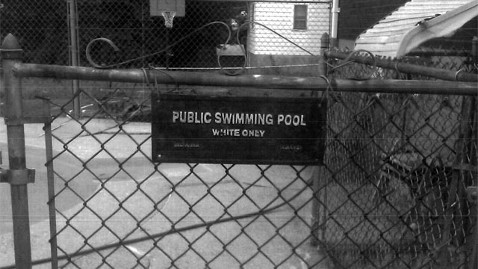Exclusive: ‘White Only’ Pool Sign Owner Explains

A female landlord, Jamie Hein, had a sign that read, "Public Swimming Pool, White Only" hanging on a gate at her house and her private pool. (Photo credit: Ohio Civil Rights Commission)
An Ohio landlord accused of discriminating against an African-American girl with a "white only" sign at her swimming pool told ABCNews.com that the sign was an antique and a decoration.
"I'm not a bad person," said Jamie Hein of Cincinnati. "I don't have any problem with race at all. It's a historical sign."
The sign in question reads, "Public Swimming Pool, White Only." It is dated 1931 and from Alabama.
Hein, 31, was unapologetic about the racist origins of the sign that she displayed at the entrance to her pool. She said she collects antiques and was given the sign as a gift. She also said that even though the sign seems to indicate that the pool is public, the pool is on her private property and "everybody has to ask before getting in my pool."
Michael Gunn, 40, is the man who took issue with Hein's sign and filed a discrimination charge with the Ohio Civil Rights Commission. He was a tenant in one of Hein's properties.
"We invited my daughter, who is African-American, to visit and swim in the pool for the Memorial Day weekend," Gunn wrote in his complaint. "The owner, Jamie Hein, accused my daughter of making the pool 'cloudy' because she used chemicals in her hair. Days later, she posted a sign on the gate to the pool which reads, 'Public Swimming Pool, White Only.'"
Hein said that the sign had nothing to do with Gunn's daughter and that it was already up at the time of that party, but cannot be seen when the gate is open.
Gunn said the family previously "had unrestricted access to the pool area," but Hein said that was not the case. She said everyone, including her own father, has to ask permission before swimming in her pool.
Gunn did not respond to requests for comment. In his complaint, he wrote that he moved out of Hein's property in June "in order to not expose my daughter to the sign and the humiliation of the message."
The Ohio Civil Rights Commission found on Sept. 29 that Hein did violate the Ohio Civil Rights Act by posting the sign, but Hein has asked that the decision be reconsidered. The sign has since been stolen.
"I've never said anything to that child," Hein said. "If I have to stick up for my white rights, I have to stick up for my white rights. It goes both ways."
The commission will meet to come to a final decision on Jan. 12, according to Brandi Martin, a spokeswoman for the Ohio Civil Rights Commission.